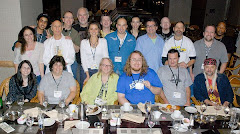 Ariel Hyatt, author of (among other things) “Music Success in Nine Weeks” has a CyberPR blogging contest running and I thought participating would be a good way to start the new year off right.
Ariel Hyatt, author of (among other things) “Music Success in Nine Weeks” has a CyberPR blogging contest running and I thought participating would be a good way to start the new year off right. Step one of the contest is to buy the book. I already had it – I’d purchased it at a music conference in late 2008. I’d gone through it then and done some of the things she recommends. But that was months ago and I think it’s a grand idea have another look. Get motivated, think clearly, be the architect of my own success.
Step two of the contest is to blog your experience as you work through the book. So here I go.
Well, even though I’d read the book before and I know I had worked on various things in it… I really liked reading the first chapter again. “Getting Mentally Prepared” talks about creating visions and goals for the next year and for your lifetime. I like Ariel’s idea of getting away from the computer and creating a vision board for yourself with colours and shapes. The act of physically writing something down seems to keep it in my mind longer. I work better if I have my tasks and goals outlined and in front of me. I spent some time thinking about the chapter and thinking about my goals for 2010.
Over the course of the year I will:
~CONTINUING EDUCATION 2010
-work through Ariel Hyatt’s “Music Success in Nine Weeks” book
-complete the tutorials for Cubase Studio 5
-take lessons/learn a new instrument (perhaps violin)
-learn the fingering for flute, oboe, trumpet & sax on my wind controller
-work through Robin Fredericks “Shortcuts to Hit Songwriting” book
-participate in Bob Baker’s “Advanced Music Marketing” course
~BUSINESS 2010
-work through David Allen’s “Getting Things Done” again
-get a safety deposit box for back-up discs & paperwork
-establish good routines
-be the best teacher/mentor I can be
-keep timesheets for each track I work on
-keep track of time spent on various tasks so can streamline
-at the end of each day, write down 5 successes for that day; and write down 6 tasks to do the following day to assist in moving towards my goals (this is from Ariel’s book)
~MUSIC COMPOSITION 2010
-write and sign 100 tracks
-write/record/produce my first LOTR-inspired album
-catch-up or bow out of outstanding co-writes due to pressures of work
~LIFESTYLE 2010
-swim 3 or more times per week
-eat healthy
-stay in touch with family & friends
-travel
-keep up with the house
-get that dental work done
~MONEY 2010
-pay off 2 more debts
-save for travel & business needs
-make $2,000 from music placements
~VISUAL ART 2010
-work on artwork for late summer show
-attend life drawing regularly for inspiration & practice
~WRITING 2010
-keep up with my blog
-keep a file of ideas and musings for my book
Ariel also suggests coming up with lifetime goals, and I wrote several down, things like: be debt free by 2012; write one or more books based on what I teach; write & produce several albums; have 200 tracks signed by middle of 2012; be on TV; have music in films I adore; overcome past programming and SHINE; work to be a well-respected composer; be a good friend. I suppose I could add it's my dream to spend a month in Paris, just renting a place & taking in the ambience; and spend a month in Florence doing the same; and be able to winter in California & spring/summer/fall at home ;)





















2004-VikkiFlawith.jpg)






















